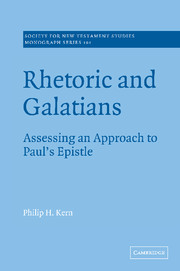Book contents
- Frontmatter
- Contents
- Preface
- List of abbreviations
- 1 Introduction
- 2 Towards a definition of rhetoric
- 3 Methods of rhetorical analysis and Galatians
- 4 Rhetorical structure and Galatians
- 5 Rhetorical species and Galatians
- 6 The language of Paul's letters: 1. As evaluated by early Christian writers
- 7 The language of Paul's letters: 2. The contribution of modern studies
- 8 Conclusions
- Select bibliography
- Index of subjects
- Index of modern authors
- Society for New Testament Studies
8 - Conclusions
Published online by Cambridge University Press: 22 September 2009
- Frontmatter
- Contents
- Preface
- List of abbreviations
- 1 Introduction
- 2 Towards a definition of rhetoric
- 3 Methods of rhetorical analysis and Galatians
- 4 Rhetorical structure and Galatians
- 5 Rhetorical species and Galatians
- 6 The language of Paul's letters: 1. As evaluated by early Christian writers
- 7 The language of Paul's letters: 2. The contribution of modern studies
- 8 Conclusions
- Select bibliography
- Index of subjects
- Index of modern authors
- Society for New Testament Studies
Summary
By defining rhetoric's various levels of discourse and exploring its relationship to that specific form of rhetoric described in the handbooks, it has been argued that classical handbook rhetoric is a quite focused and even venue-driven activity which is not found in the epistle to the Galatians.
This leaves us to explain how a rhetorical reading of Galatians has become so widely accepted. The orientation of any comparison must be divided between subject and objects (i.e. between the objects of comparison and the one doing the comparing), suggesting that only rigid conformity to strictly defined criteria can begin to approach an acceptable level of ‘objectivity’. Frank Kermode observes of another sphere:
There must be supra-literary forces, cultural pressures, which tend to make us seek narrative coherence, just as we expect a conundrum to have an answer, and a joke a point. Our whole practice of reading is founded on such expectations, and of course, the existence of genres such as the pointless joke and the deviant conundrum depends upon the prior existence of the normal sort.
It is this sense of expectation which robs us of true objectivity, for if readers supply the missing pieces of a text based on expectations (regardless of their source) then they will sometimes create parallels between types of texts when the mind performs its inevitable and often unconscious task of bending the data to fit the categories.
- Type
- Chapter
- Information
- Rhetoric and GalatiansAssessing an Approach to Paul's Epistle, pp. 256 - 261Publisher: Cambridge University PressPrint publication year: 1998



